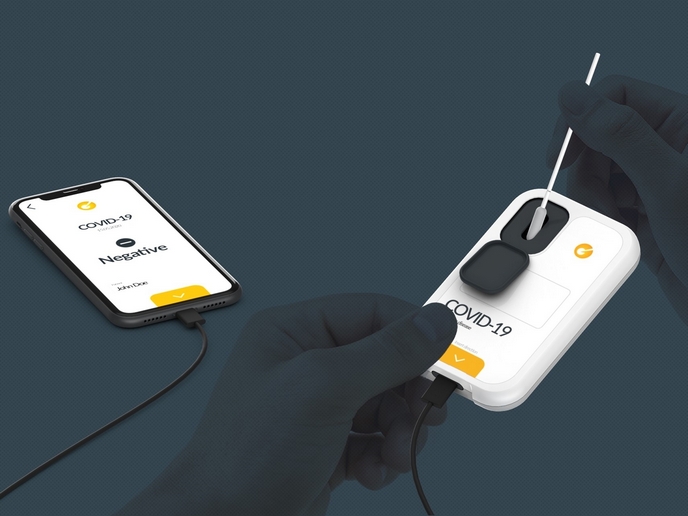Smartphone-connected platform for rapid COVID-19 detection
The COVID-19 pandemic has underscored the critical need for rapid and reliable identification of individuals infected with SARS-CoV-2, including asymptomatic carriers. Current molecular diagnostic methods fall into two primary categories: those detecting viral antigens and those detecting viral RNA. Antigen-based rapid tests, such as lateral flow assays, are widely used due to their simplicity, low cost and quick results. However, they lack the sensitivity of viral RNA detection methods, such as polymerase chain reaction (PCR), which remains the gold standard but requires specialised infrastructure and trained personnel.
Innovative technology
The EU-funded DECISION project has developed a revolutionary, portable diagnostic platform for rapid COVID-19 detection, using cutting-edge pulse-controlled amplification (PCA) technology. The technology is based on the enzymatic amplification of the SARS-CoV-2 RNA, enabling sensitive and specific detection of the virus. Unlike traditional PCR, which requires long heating and cooling phases, PCA uses short electrical pulses to heat a small fraction of the reaction volume. This localised heating allows for ultrafast thermocycling, reducing the time needed for amplification from several hours to just 15–25 minutes.
Significant advantages over conventional methods
One of the major advantages of the DECISION test is its quick turnaround time, offering a significant improvement over existing testing methods. Conventional PCR, though reliable, typically requires several hours for processing and must be carried out in a laboratory setting. This delay in obtaining results often means that patients must remain in quarantine until their test results are available, potentially leading to further transmission of the virus. The DECISION platform can be used anywhere, from drive-through testing centres and airports to hospitals and even from the comfort of one’s own home. Moreover, the DECISION test is not only faster but also cost-effective. Its energy-efficient design and minimal power requirements enable the device to be manufactured at a low cost, making it accessible to a wide range of settings. The disposable nature of the microfluidic chip used in the platform further enhances its convenience, allowing for simple, one-time use without the need for specialised training or expensive equipment. Importantly, the compact device requires minimal energy and can be powered via batteries or USB connections, making it ideal for mobile and point-of-care use. “This novel approach aims to offer an affordable, disposable, and easy-to-use testing solution that can deliver accurate results within minutes,” emphasises Johannes Peham, project coordinator.
Sensitivity and flexibility
The test’s sensitivity is another highlight, demonstrating an ability to detect as few as 10–100 copies of the viral RNA per reaction. This high level of sensitivity ensures that even low levels of viral material can be accurately identified, making the test suitable for early detection of COVID-19, for example, in individuals who may not yet be exhibiting symptoms. While the focus of the DECISION project has been on detecting SARS-CoV-2, the platform’s flexibility allows for the detection of other pathogens as well. By redesigning the sequence-specific oligonucleotides used in the test, the PCA technology can be adapted to detect a wide range of viruses and bacteria, positioning it as a versatile tool for future diagnostic needs. “This diversification will increase the utility of the device and its potential impact on public health,” concludes Peham.
Keywords
DECISION, COVID-19, SARS-CoV-2, viral RNA, polymerase chain reaction, pulse-controlled amplification, virus, diagnostics, point-of-care use, rapid test



